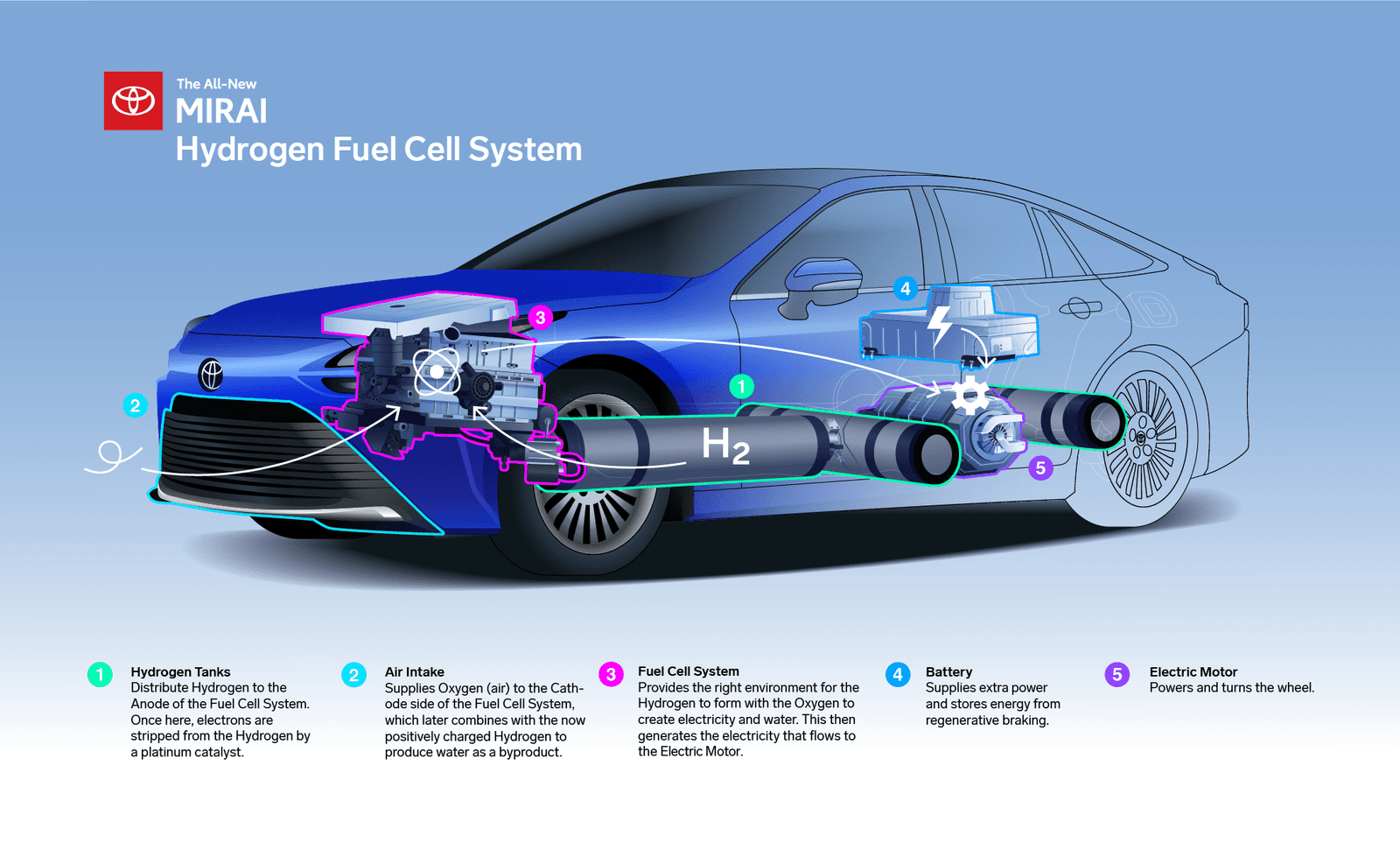Imagine driving a car that emits only water vapor and produces zero greenhouse gas emissions. Sounds like a dream, doesn’t it? Well, with the advancements in hydrogen fuel cell technology for electric vehicles (EVs), this dream is becoming more of a reality. In this article, we will explore the current state of hydrogen fuel cell technology for EVs and how it is shaping the future of sustainable transportation.
Introduction to Hydrogen Fuel Cell Technology
How does hydrogen fuel cell technology work?
Hydrogen fuel cell technology is a clean and efficient way to power electric vehicles (EVs). Unlike traditional gasoline-powered vehicles, fuel cell vehicles use hydrogen gas as a fuel source, which is converted into electricity through a chemical reaction. This electricity then powers the vehicle’s electric motor, propelling it forward. The process involves the splitting of hydrogen atoms into protons and electrons, with the protons passing through a membrane and combining with oxygen from the air to produce water vapor as a byproduct. This emission-free process makes hydrogen fuel cell vehicles a promising alternative to traditional combustion engine vehicles.
Advantages and disadvantages of hydrogen fuel cell technology
Hydrogen fuel cell technology offers several advantages over other forms of clean energy for EVs. Firstly, fuel cell vehicles produce zero emissions, as the only byproduct of the chemical reaction is water vapor. This helps to reduce greenhouse gas emissions and combat climate change. Additionally, fuel cells offer longer driving ranges compared to battery-electric vehicles (BEVs), allowing for extended trips without the need for frequent recharging. Another benefit of hydrogen fuel cell technology is its quick refueling time. Unlike the hours it takes to fully recharge a battery-powered vehicle, refueling a fuel cell vehicle with hydrogen takes just a few minutes.
However, there are also some disadvantages associated with hydrogen fuel cell technology. One of the major challenges is the high production costs. Currently, the cost of manufacturing fuel cell systems is relatively high, making fuel cell vehicles more expensive than traditional gasoline-powered cars and even BEVs. Furthermore, the lack of hydrogen refueling infrastructure is a significant limitation. With only a few hydrogen refueling stations available, it can be inconvenient for fuel cell vehicle owners to find a place to refuel. Lastly, the competition from BEVs poses a challenge to the widespread adoption of hydrogen fuel cell vehicles. While both technologies offer environmental benefits, BEVs have gained more traction in the market due to their lower costs and more developed charging infrastructure.
Current Development of Hydrogen Fuel Cell Technology for EVs
Expanding hydrogen refueling infrastructure
To address the challenge of the limited refueling infrastructure, there have been efforts to expand the hydrogen refueling network. Governments and private companies are working together to invest in building more hydrogen refueling stations, especially in regions where hydrogen fuel cell vehicles are gaining popularity. In countries like Japan, Germany, and the United States, significant progress has been made in increasing the availability of refueling stations, making it more convenient for fuel cell vehicle owners to find a place to refuel.
Increasing vehicle options with hydrogen fuel cells
Another area of development is the expansion of vehicle options with hydrogen fuel cells. Initially, fuel cell vehicles were limited in terms of models and manufacturers, but over the past few years, more automakers have entered the market with their own fuel cell vehicles. This increased competition has led to advancements in technology and improvements in performance. There is now a wider range of fuel cell vehicles available, offering consumers more choice when it comes to selecting a clean and efficient mode of transportation.
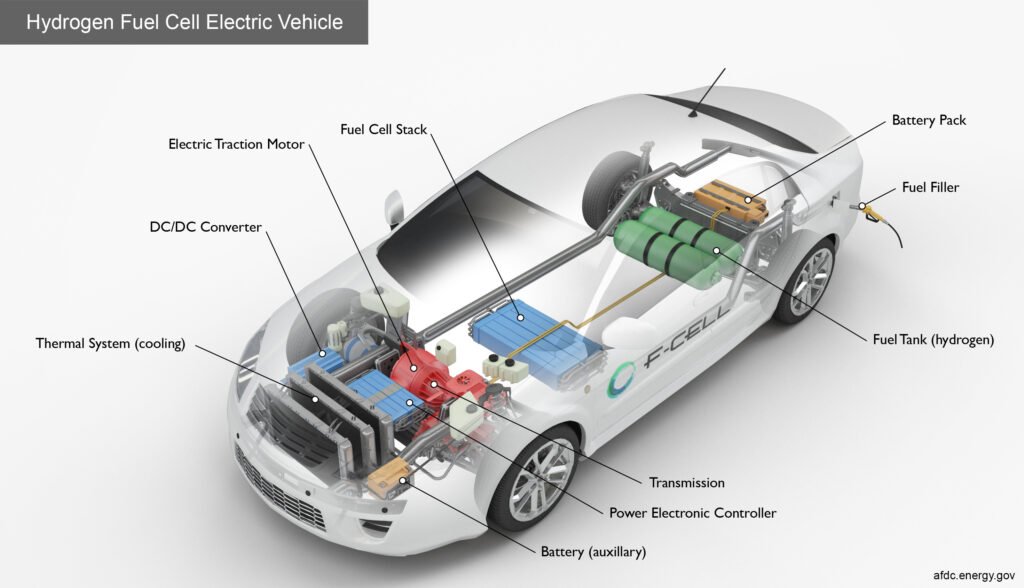
This image is property of afdc.energy.gov.
Benefits of Hydrogen Fuel Cell Technology for EVs
Zero-emission vehicles
One of the key benefits of hydrogen fuel cell technology for EVs is the ability to produce zero emissions. As mentioned earlier, the only byproduct of the chemical reaction in a fuel cell vehicle is water vapor. This makes fuel cell vehicles an excellent solution for reducing air pollution and greenhouse gas emissions. By transitioning from traditional combustion engine vehicles to fuel cell vehicles, we can help mitigate the effects of climate change and improve air quality in our cities and communities.
Longer driving ranges
Compared to BEVs, fuel cell vehicles offer longer driving ranges. Hydrogen fuel cell vehicles can travel over 300 miles on a single tank, while the range of BEVs typically falls between 100-300 miles, depending on the model. This extended range is advantageous for long-distance travel and addressing range anxiety, as fuel cell vehicle owners can drive for longer periods without worrying about finding a charging station. The longer driving range of hydrogen fuel cell vehicles makes them a viable option for individuals and businesses that require frequent long trips.
Quick refueling times
One of the major advantages of hydrogen fuel cell technology is the quick refueling times. While BEVs require several hours to fully recharge, refueling a fuel cell vehicle with hydrogen takes only a few minutes. This significantly reduces the downtime associated with recharging and allows for more efficient use of time. Quick refueling times also make fuel cell vehicles more convenient for long-distance travel, as drivers can make pit stops for refueling without experiencing significant delays. The quick refueling feature of fuel cell vehicles is particularly appealing to busy individuals and fleets that rely on timely transportation.
Challenges and Limitations of Hydrogen Fuel Cell Technology for EVs
High production costs
One of the main challenges facing hydrogen fuel cell technology is the high production costs. Fuel cell systems require expensive materials and intricate manufacturing processes. As a result, fuel cell vehicles are priced higher than traditional combustion engine vehicles and even BEVs. The high cost of fuel cell systems makes it difficult for these vehicles to compete with more affordable alternatives in the market. However, there is optimism that advancements in manufacturing techniques, economies of scale, and research and development efforts can help drive down the production costs of fuel cell vehicles.
Lack of refueling infrastructure
The limited availability of hydrogen refueling infrastructure is another major challenge for the widespread adoption of fuel cell vehicles. While efforts are being made to expand the network of refueling stations, the current infrastructure is far from extensive compared to the existing network of gasoline stations or electric vehicle charging stations. The lack of refueling infrastructure raises concerns about range anxiety and the practicality of owning a fuel cell vehicle, especially for individuals who rely on their vehicles for daily commuting or frequent long-distance travel. To address this limitation, there is a need for continued investment in hydrogen refueling infrastructure to support the growing demand for fuel cell vehicles.
Competition from battery-electric vehicles
One of the greatest challenges for hydrogen fuel cell technology is the competition from BEVs. Battery-electric vehicles have gained significant momentum in recent years, with more automakers offering a range of models and prices. The lower costs of BEVs compared to fuel cell vehicles, combined with a more developed charging infrastructure, have contributed to their growing popularity. Many consumers and businesses are choosing BEVs as their preferred clean energy option for transportation, posing a challenge to the widespread adoption of fuel cell vehicles. To stay competitive, the fuel cell industry needs to find ways to further reduce costs, improve performance, and expand the refueling infrastructure.
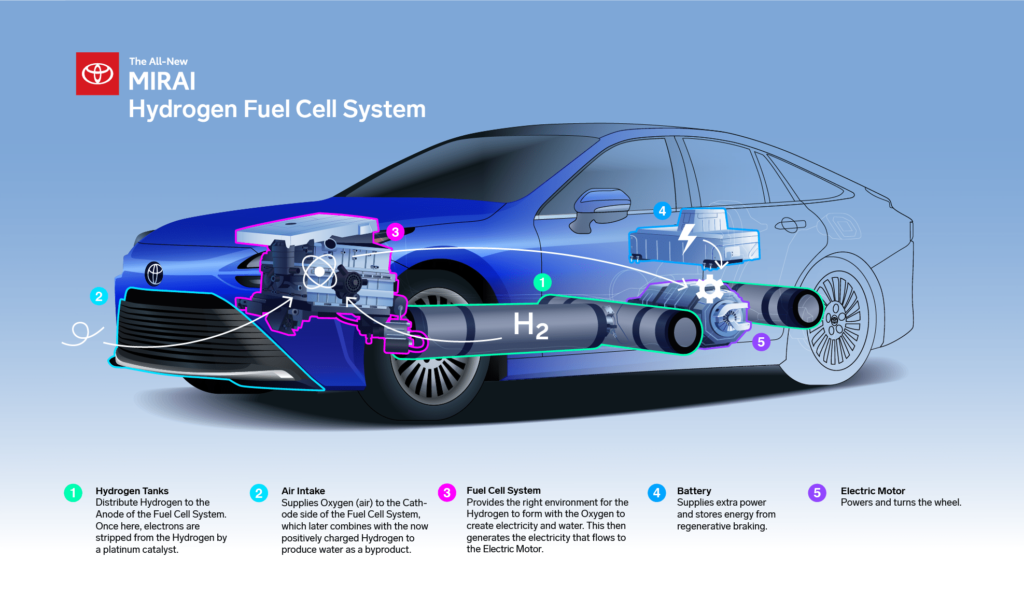
This image is property of media.wired.com.
Research and Investments in Hydrogen Fuel Cell Technology
Government support and funding
Government support and funding play a crucial role in advancing hydrogen fuel cell technology. Many governments around the world recognize the potential of fuel cell vehicles in reducing greenhouse gas emissions and promoting sustainable transportation. As a result, they have implemented various incentive programs, tax credits, and subsidies to encourage the development and adoption of fuel cell vehicles. In addition to financial support, governments also invest in research and development initiatives to drive technological advancements in fuel cell technology and address key challenges.
Partnerships and collaborations
Partnerships and collaborations between automakers, energy companies, and research institutions have accelerated the progress of hydrogen fuel cell technology. By pooling resources, expertise, and knowledge, these collaborations can tackle complex technological challenges and drive innovation. Partnerships between automakers and energy companies, for example, can help establish a stronger hydrogen refueling infrastructure, ensuring that fuel cell vehicles have the necessary infrastructure to thrive. Collaborations between research institutions and industry players can also lead to breakthroughs in fuel cell technology, improving efficiency, durability, and cost-effectiveness.
Technological advancements
Significant technological advancements have been made in hydrogen fuel cell technology. Researchers and engineers are constantly working to improve the efficiency and performance of fuel cells, making them more practical and cost-effective for commercial use. Advancements in catalyst materials, membrane designs, and fuel cell system integration have contributed to greater efficiency and durability of fuel cell vehicles. Further research and development efforts are expected to result in even higher efficiencies, longer lifespans, and reduced production costs, making fuel cell vehicles a competitive and viable option for transportation.
Commercial Deployment of Hydrogen Fuel Cell Vehicles
Availability of hydrogen fuel cell vehicles in the market
Over the past decade, the availability of hydrogen fuel cell vehicles in the market has increased. Initially, fuel cell vehicles were limited to a few models from a handful of automakers. However, as the technology has matured and gained momentum, more automakers are entering the market with their own fuel cell vehicles. Companies like Toyota, Honda, Hyundai, and Mercedes-Benz offer hydrogen fuel cell vehicles, providing consumers with a wider range of choices. The expansion of vehicle options has made fuel cell vehicles more accessible to individuals and businesses looking for a clean and sustainable mode of transportation.
Market penetration and consumer adoption
While the market penetration of hydrogen fuel cell vehicles is still relatively low compared to traditional gasoline-powered vehicles and BEVs, there is growing interest and consumer adoption. Fuel cell vehicles are particularly favored by fleet operators and businesses that require long-range capabilities and quick refueling times. Additionally, government incentives and support have played a significant role in increasing consumer adoption, as financial incentives make fuel cell vehicles more attractive and affordable. As the refueling infrastructure continues to expand and production costs decrease, consumer adoption of fuel cell vehicles is expected to increase, contributing to a more sustainable transportation future.
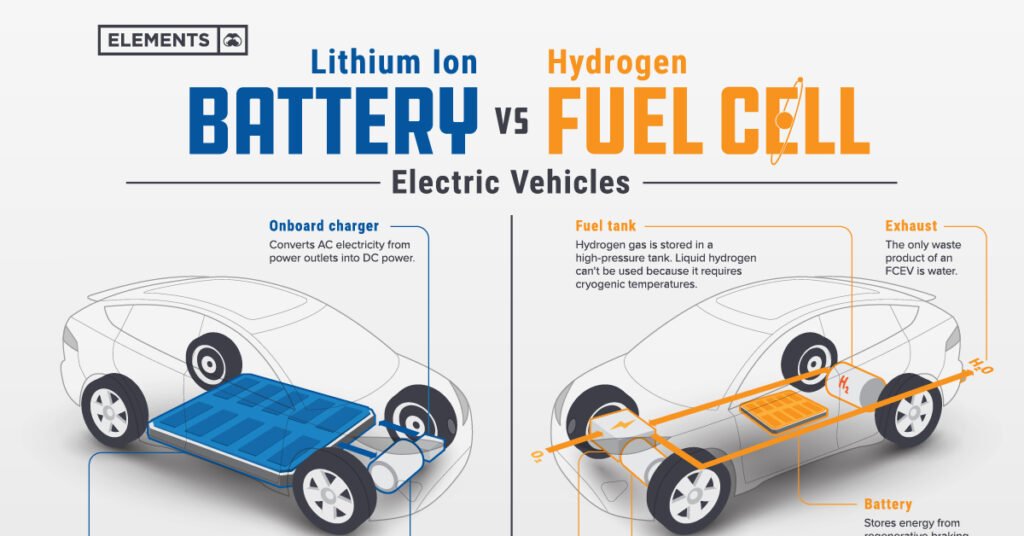
This image is property of www.visualcapitalist.com.
Comparison with Battery-Electric Vehicles
Differences in technology and infrastructure
Hydrogen fuel cell vehicles and BEVs differ in terms of technology and infrastructure requirements. While both are considered zero-emission vehicles, the technologies used to generate electricity differ. BEVs rely on rechargeable lithium-ion batteries that store electricity for powering the vehicle’s electric motor. On the other hand, fuel cell vehicles use hydrogen gas and fuel cell systems to generate electricity through a chemical reaction. In terms of infrastructure, BEVs require widespread charging stations, which can range from simple household outlets to specialized fast chargers. Fuel cell vehicles require dedicated hydrogen refueling stations that store and dispense hydrogen gas under high pressure. The infrastructure requirements for refueling stations are more complex and costly compared to charging stations.
Advantages and disadvantages compared to battery-electric vehicles
Both hydrogen fuel cell vehicles and BEVs offer advantages and disadvantages compared to each other. BEVs have gained widespread popularity due to their lower costs and more developed charging infrastructure. Charging a BEV can be done at home or at public charging stations, providing convenience and accessibility. BEVs also have the advantage of utilizing an existing electricity distribution system, making it easier to scale up the charging infrastructure. However, the limited driving range and longer charging times of BEVs compared to fuel cell vehicles can be disadvantages, especially for long-distance travel. Fuel cell vehicles, on the other hand, offer longer driving ranges and quick refueling times, making them more suitable for certain applications, such as fleet operations. However, the high production costs and limited refueling infrastructure pose challenges to the widespread adoption of fuel cell vehicles.
Environmental Impact of Hydrogen Fuel Cell Technology for EVs
Reducing greenhouse gas emissions
One of the main environmental benefits of hydrogen fuel cell technology is its ability to reduce greenhouse gas emissions. Fuel cell vehicles produce zero emissions at the tailpipe, as the only byproduct of the chemical reaction is water vapor. This is in stark contrast to traditional combustion engine vehicles that release harmful pollutants, including carbon dioxide and nitrogen oxides, contributing to air pollution and climate change. By transitioning to fuel cell vehicles and utilizing hydrogen as a clean energy source, we can significantly reduce greenhouse gas emissions and work towards a more sustainable future.
Life cycle analysis of hydrogen fuel production
While hydrogen fuel cell vehicles themselves produce zero emissions, it is important to consider the environmental impact of hydrogen fuel production. The production of hydrogen can be done through various methods, including electrolysis, steam methane reforming, and biomass gasification. Each method has its own environmental implications in terms of energy consumption, carbon emissions, and water usage. Life cycle analysis studies evaluate the overall environmental impact of hydrogen fuel production, taking into account all stages, from raw material extraction to fuel delivery. By optimizing the production processes and utilizing renewable energy sources, the environmental footprint of hydrogen fuel production can be minimized.
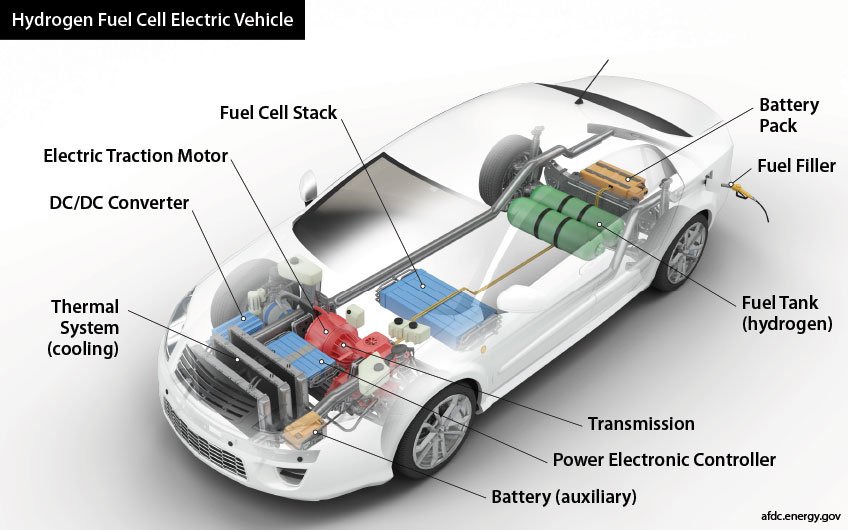
This image is property of www.nrel.gov.
Future Outlook for Hydrogen Fuel Cell Technology
Technological advancements and cost reductions
The future of hydrogen fuel cell technology for EVs looks promising, driven by ongoing technological advancements and cost reductions. As research and development efforts continue, engineers and scientists are discovering new materials, designs, and manufacturing techniques that improve the efficiency, durability, and affordability of fuel cell systems. Innovations in catalyst materials, membranes, and system integration will contribute to higher efficiencies and longer lifespans for fuel cell vehicles. Additionally, economies of scale and increased production volumes are expected to drive down the overall cost of fuel cell systems, making fuel cell vehicles more accessible to a wider range of consumers.
Potential for widespread adoption
With continued advancements in technology, infrastructure development, and supportive policies, there is potential for widespread adoption of hydrogen fuel cell technology for EVs. Government support and investments in research and development are critical in advancing the technology and addressing key challenges. As the refueling infrastructure expands, the convenience and accessibility of fuel cell vehicles will improve, making them a more viable option for consumers. The potential for hydrogen fuel cell technology lies in its ability to provide zero-emission transportation with longer driving ranges and quick refueling times. As the industry continues to innovate and overcome hurdles, fuel cell vehicles have the potential to play a significant role in achieving a sustainable and clean transportation future.
Conclusion
In conclusion, hydrogen fuel cell technology is a promising solution for powering electric vehicles. The technology works by converting hydrogen gas into electricity through a chemical reaction, offering several advantages such as zero emissions, longer driving ranges, and quick refueling times. However, there are challenges and limitations that need to be addressed, such as the high production costs and limited refueling infrastructure. The industry is actively working to overcome these challenges through government support, partnerships, technological advancements, and investments. The future outlook for hydrogen fuel cell technology is positive, with ongoing advancements and a potential for widespread adoption. By embracing hydrogen fuel cell vehicles, we can reduce greenhouse gas emissions, improve air quality, and move towards a more sustainable transportation future.
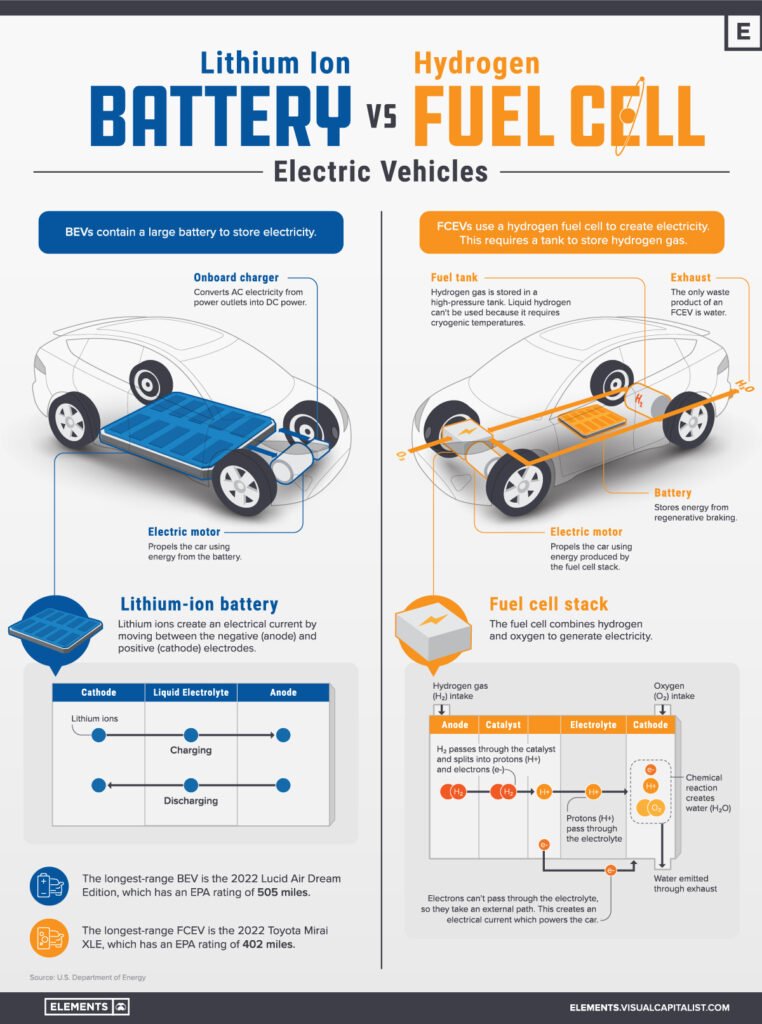
This image is property of elements.visualcapitalist.com.

